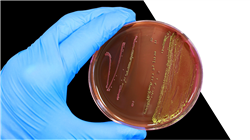University certificate
The world's largest faculty of medicine”
Description
With this 100% online Postgraduate diploma, you will cover everything from the diagnosis and treatment of infections in highly complex environments, such as ICUs, to the implementation of preventive and control strategies.”

The Clinical Management of Multidrug-Resistant Bacteria represents a growing challenge for healthcare professionals around the world. These bacteria have developed resistance to multiple classes of antibiotics, complicate the treatment of common infections and can lead to adverse clinical outcomes and prolonged hospital stays.
That is how this Postgraduate diploma was created, which will focus on the management of patients with multidrug-resistant infections in Intensive Care Units (ICU), providing specialized knowledge in the diagnosis and treatment of common infections in this critical environment. In addition, key skills for the prevention of these infections, which is crucial to mitigate their spread.
Likewise, the course will delve into Multidrug-Resistant Gram Negative Bacteria, addressing the selection of appropriate empirical antibiotic treatments for suspected infections by these microorganisms. The implementation and relevance of PROA (Program for Optimization of Antimicrobial Agents) teams will also be discussed, specifically in the context of multidrug-resistant Gram Negative Bacteria, highlighting their role in improving clinical outcomes and reducing antimicrobial resistance.
Finally, antibiotic resistance in Gram Positive Bacteria, such as Streptococcus, Enterococcus and Staphylococcus, will be examined. The implications of this resistance, both in Public Health and in daily clinical practice, will also be explored, and effective strategies to mitigate its impact will be analyzed. In this sense, a framework will be provided to understand how antibiotic resistance in these bacteria can affect the management of common diseases and how appropriate preventive and therapeutic measures can be implemented to address this emerging challenge in modern medicine.
Therefore, TECH has designed a complete university program, fully online and flexible, which will only require an electronic device with an Internet connection to access all the contents. Additionally, it is based on the revolutionary learning methodology known as Relearning, which consists of the repetition of key concepts for an optimal and organic assimilation of the contents.
You will be trained in the proper selection of empirical antibiotic treatments and in the optimization of the use of antimicrobials, through the best didactic materials, at the forefront of technology and education”
This Postgraduate diploma in Clinical Management of Multidrug-Resistant Bacteria contains the most complete and up-to-date scientific program on the market. Its most notable features are:
- The development of practical cases presented by experts in Microbiology, Medicine and Parasitology
- The graphic, schematic and eminently practical contents with which it is conceived gather scientific and practical information on those disciplines that are indispensable for professional practice
- Practical exercises where the self-assessment process can be carried out to improve learning
- Its special emphasis on innovative methodologies
- Theoretical lessons, questions to the expert, debate forums on controversial topics, and individual reflection assignments
- Content that is accessible from any fixed or portable device with an Internet connection
The program’s teaching staff includes professionals from the sector who contribute their work experience to this specializing program, as well as renowned specialists from leading societies and prestigious universities.
The multimedia content, developed with the latest educational technology, will provide the professional with situated and contextual learning, i.e., a simulated environment that will provide immersive education programmed to learn in real situations.
This program is designed around Problem-Based Learning, whereby the professional must try to solve the different professional practice situations that arise during the course. For this purpose, students will be assisted by an innovative interactive video system created by renowned experts in the field of educational coaching with extensive experience.
You will develop essential skills for the prevention of multidrug-resistant bacteria infections in the ICU, ensuring a comprehensive approach to the management of these complex cases.
What are you waiting for to enroll?’’

Bet on TECH! You will delve into PROA (Program for Optimization of Antimicrobials) teams for the management of these infections, promoting practices that optimize the use of antimicrobials’’
Syllabus
This program is structured in specialized modules that will cover from the management of infections in Intensive Care Units (ICU), with a focus on advanced diagnosis and treatment, to the appropriate selection of empirical treatments for multidrug-resistant Gram Negative Bacteria. In addition, resistance in Gram Positive Bacteria such as Streptococcus, Enterococcus and Staphylococcus will be discussed in depth, exploring its implications in Public and Clinical Health. The importance of Antimicrobial Optimization Programs (PROA) and resistance mitigation strategies will also be emphasized.

The contents of this Postgraduate Diploma have been carefully designed to address the most critical and current aspects of treatment and prevention of multidrug-resistant bacteria infections’’
Module 1. Management of Patients with Multidrug-Resistant Bacterial Infections in Intensive Care Units (ICU)
1.1. Colonization and Infection of Patients in ICUs
1.1.1. Types of ICUs
1.1.2. Epidemiology
1.1.3. Risk Factors Associated with Infection in ICUs
1.2. Impact of Nosocomial Infections in the Critically Ill Patient
1.2.1. Importance of Nosocomial Infections in ICUs
1.2.2. Risk Factors for Nosocomial Infections
1.2.2.1. Patient Factors
1.2.2.2. Factors of the ICU Environment
1.2.2.3. Factors Related to the Healthcare Personnel
1.2.2. Impact of Nosocomial Infections in Immunocompromised Patients
1.2.3. Impact on Length of Stay in the ICU
1.3. Pneumonia Associated with Mechanical Ventilation
1.3.1. Etiology
1.3.2. Diagnosis
1.3.3. Treatment
1.4. Urinary Tract Infections Associated with Catheters
1.4.1. Etiology
1.4.2. Diagnosis
1.4.3. Treatment
1.5. Primary Bacteremias and Catheter-Related Bacteremias
1.5.1. Etiology
1.5.2. Diagnosis
1.5.3. Treatment
1.6. Pseudomembranous Colitis
1.6.1. Etiology
1.6.2. Diagnosis
1.6.3. Treatment
1.7. Infections by Opportunistic Pathogens
1.7.1. Etiology
1.7.2. Diagnosis
1.7.3. Treatment
1.8. Appropriate Use of Antibiotics
1.8.1. Programs for the Optimization of Antibiotic use (PROA) in the ICU
1.8.2. Antibiotic Therapy Strategies for the Treatment of Gram-Negative Patients
1.8.3. Antibiotic Therapy Strategies for the Treatment of Gram-Positive Patients
1.8.4. Antibiotic Therapy Strategies for the Treatment of Co-Infections
1.9. Strategies for the Prevention of BMR Infections in the ICU
1.9.1. Hygiene Measures
1.9.2. Infection Control Measures
1.9.3. Protocols and Clinical Practice Guidelines
1.9.4. Education and Training of ICU Personnel
1.9.5. Participation of Patients and their Families
1.10. Infection Prevention Strategies in the ICU
1.10.1. Infection Prevention Strategies in the ICU According to the Focus
1.10.1.1. Pneumonia
1.10.1.2. Bacteremia
1.10.1.3. Urinary Infection
1.10.2. Evaluation and Quality Indicators in the Prevention of Infections
1.10.3. Evaluation and Continuous Improvement Tools
1.10.4. Successful Examples of Infection Prevention in ICUs
Module 2. Multidrug-Resistant Gram Negative Bacteria
2.1. Infections Due to Gram-Negative Microorganisms
2.1.1. Epidemiology of Gram-Negative Microorganisms
2.1.2. Community and Nosocomial Infections by Gram-Negative Microorganisms
2.1.3. Relevance of Infections by Multidrug-Resistant Gram-Negative Microorganisms
2.2. Pathogenesis of Infections by Gram-Negative Microorganisms
2.2.1. Factors Related to Gram-Negative Microorganisms
2.2.2. Patient Factors in Gram-Negative Infections
2.2.3. Other Factors in Gram-Negative Infections
2.3. Clinical Evaluation of Patients with Multidrug-Resistant Gram-Negative Infections
2.3.1. Medical History
2.3.2. Clinical Evaluation of Patients
2.3.3. Other Data of Interest
2.4. Complementary Tests in Infections by Multidrug-Resistant Gram-Negative Microorganisms
2.4.1. Blood Tests
2.4.2. Imaging Tests
2.4.3. Microbiological Techniques
2.5. Estimation of Severity in Patients with Infections by Multidrug-Resistant Gram-Negative Microorganisms
2.5.1. Gram-Negative Multidrug-Resistant Microorganisms
2.5.2. Traditional Approach to Severity Estimation
2.5.3. Practical Conclusions
2.6. Risk of Acquiring Infections by Multidrug-Resistant Gram-Negative Microorganisms
2.6.1. Clinical Factors in the Acquisition of Infections by Multidrug-Resistant Gram-Negative Microorganisms
2.6.2. Other Factors in the Acquisition of Infections by Multidrug-Resistant Gram-Negative Microorganisms
2.6.3. Tools to Calculate the Risk of Presence of Multidrug-Resistant Gram-Negative Microorganisms
2.7. Empirical Treatment in the Suspicion of Infections by Multidrug-Resistant Gram-Negative Microorganisms
2.7.1. Microorganisms Involved According to Localization
2.7.2. Comprehensive Assessment of Patients with Suspected Infections by Multidrug-Resistant Gram-Negative Microorganisms
2.7.3. Selection of Empirical Antibiotic Treatment
2.8. Targeted Therapy in Infections by Multidrug-Resistant Gram-Negative Microorganisms
2.8.1. Adjustment of Antibiotic Therapy According to Microbiological Results
2.8.2. Follow-up of Multidrug-Resistant Gram-Negative Microorganism Infection
2.8.3. Most Relevant Side Effects of Antibiotherapy
2.9. Duration of Antibiotherapy in Infections by Multidrug-Resistant Gram-Negative Microorganisms
2.9.1. Estimation of the Duration of Antibiotic Treatment in Infections by Multidrug-Resistant Gram-Negative Microorganisms
2.9.2. Relevance of Focus Control in Infections by Multidrug-Resistant Gram-Negative Microorganisms
2.9.3. Special Considerations Related to Antibiotic Therapy in These Infections
2.10. PROA Teams in Infections Caused by Multidrug-Resistant Gram-Negative Microorganisms
2.10.1. PROA Teams: History
2.10.2. Impact of PROA Teams on the Correct Use of Antibiotic Treatments
2.10.3. Challenge of PROA Teams in the Treatment of Infections Caused by Multiresistant Gram-Negative Microorganisms
Module 3. Antibiotic Resistance in Streptococcus, Enterococcus and Staphylococcus
3.1. Infections Due to Gram-Positive Bacteria
3.1.1. Natural Habitat of Gram-Positive Pathogens
3.1.2. Nosocomial Infections due to Gram-Positive Bacteria
3.1.3. Community-Acquired Infections by Gram-Positive Bacteria
3.2. In Vitro and in Vivo Systems for the Study of Resistance in Gram-Positive Bacteria
3.2.1. Biofilms
3.2.2. Cellular Models
3.2.3. Animal Models
3.3. Streptococcus Pneumoniae
3.3.1. Clinical Significance
3.3.2. Resistance Mechanisms
3.3.3. Biofilms
3.3.4. Treatment Options
3.4. Streptococcus Pyogenes
3.4.1. Clinical Significance
3.4.2. Resistance Mechanisms
3.4.3. Biofilms
3.4.4. Treatment Options
3.5. Streptococcus Agalactiae
3.5.1. Clinical Significance
3.5.2. Resistance Mechanisms
3.5.3. Biofilms
3.5.4. Treatment Options
3.6. Enterococcus Faecalis
3.6.1. Clinical Significance
3.6.2. Resistance Mechanisms
3.6.3. Biofilms
3.6.4. Treatment Options
3.7. Enterococcus Faecium
3.7.1. Clinical Significance
3.7.2. Resistance Mechanisms
3.7.3. Biofilms
3.7.4. Treatment Options
3.8. Staphylococcus Aureus
3.8.1. Clinical Significance
3.8.2. Resistance Mechanisms
3.8.3. Biofilms
3.8.4. Treatment Options
3.9. Mycobacterium Tuberculosis
3.9.1. Clinical Significance
3.9.2. Resistance Mechanisms
3.9.3. Treatment Options
3.10. Resistance in Other Gram-Positive Bacteria
3.10.1. Coagulase-Negative Staphylococcus
3.10.2. Clostridioides Difficile
3.10.3. Emerging Gram Positive Pathogens

Through this content, you will acquire in-depth knowledge and practical skills to address the challenges associated with Multidrug-Resistant Bacteria infections in diverse clinical settings.”
Postgraduate Diploma in Clinical Management of Multidrug-Resistant Bacteria
The Postgraduate Diploma in Clinical Management of Multidrug-Resistant Bacteria developed by TECH Global University is an advanced training program designed for healthcare professionals who wish to acquire specialized knowledge in the management of bacterial infections that present resistance to multiple antibiotics. This 100% online Postgraduate Certificate provides in-depth understanding and practical skills essential to meet the global challenge of multidrug-resistant bacteria. The program covers a wide range of topics related to the epidemiology, diagnosis, treatment and prevention of infections caused by multidrug-resistant bacteria. You will learn about major resistant bacteria such as methicillin-resistant Staphylococcus aureus (MRSA), carbapenem-resistant Enterobacteriaceae (CRE) and multidrug-resistant Pseudomonas aeruginosa (MDRAP), among others. In addition, microbiological diagnostic strategies, appropriate antibiotic selection, infection control measures and management of patients with resistant infections are discussed in depth. One of the key advantages of this program is its practical and case-based approach, which will enable you to develop key skills in decision-making and effective management of multidrug-resistant bacterial infections in different clinical settings. This allows you to implement individualized, evidence-based treatment strategies, thus optimizing clinical outcomes for patients.
Master the clinical management of multidrug-resistant bacteria
The online modality of the course offers flexibility and accessibility, allowing you to access the content from anywhere and at any time that fits your schedule. Through an advanced educational platform, you will benefit from interactive resources that enrich your learning and foster collaboration among professionals. The Postgraduate Certificate is led by a team of experts in the management of multidrug-resistant bacteria, who provide personalized guidance and support throughout the program. Their clinical experience and expertise ensure high quality training relevant to the current demands of clinical practice. Enrolling in this Postgraduate Diploma is a strategic investment to enhance your skills and competencies in addressing challenging bacterial infections. This advanced training provides the tools necessary to effectively address the problem of bacterial resistance, thus contributing to improved quality of care and patient safety.







